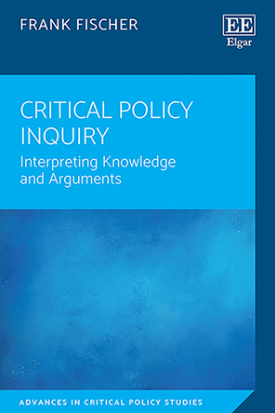Thank you for your message. The IPPA team will get back to you shortly. You first need to login here.

Critical Policy Inquiry: Interpreting Knowledge and Arguments (2024)
(Publisher : Edward Elgar Publishinh)
Author(s) : FRANK FISCHER
Frank Fischer was Distinguished Professor of Politics and Global Affairs at Rutgers University (New Jersey, USA) until he retired emeritus in 2015. During that time, he was also affiliated with the university’s Bloustein School of Planning and Public Policy. Before joining Rutgers, he taught at New York University and at the State University of New York’s Empire State College. In addition, He is a Faculty Fellow in Politics and Globalization at Kassel University. Over these years he has lectured widely in Europe, Canada, Australia, Asia and LatinAmerica on numerous topics, including environmental politics, American presidential government, participatory governance and deliberative policy analysis. Currently, he is a research associate at the Albrecht Daniel Thaer Institute at Humboldt University in Berlin.
After Rutgers, he took up residence in Berlin, Germany, where he has continued to conduct scholarly research and writing. In Germany and Europe generally, he has been a visiting scholar and lecturer at a number universities and research institutes. These have included the Wissenschaftszentrum Berlin and the universities of Kassel University, Free University of Berlin (Fulbright Scholarship), Vienna, Salzburg, Rome (La Sapienza), Institute of Economics and Political Science in Budapest, Hungary, Leiden in the Netherlands, Roskilde in Denmark, London, Australian National University, Ahmedabad Institute of Management, Nagoya in Japan, Center for Environmental Policy at the Free Science of Berlin, Institute of Advanced Sustainability Studies in Potsdam, and Humboldt University in Berlin, Sciences Po in Paris, Singapore, Televiv, Madrid, Bangkok, Nepal, Prague Poland, Lundt,Amsterdam, Tokyo, Australian National Unversity, Witswaterand in South Africa, Ahmnedbad, Columbia in New York, Brasilia, Singapore, Sciences Po, to mention a few.




